Cat Rambo's Blog, page 29
September 11, 2018
Guest Post: Eric Schwitzgebel Gives One-Point-Five Cheers for a Hugo Award for a TV Show about Ethicists’ Moral Expertise
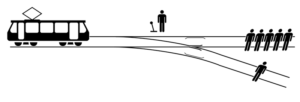 When The Good Place episode “The Trolley Problem” [won one of science fiction’s most prestigious awards, the Hugo, in the category of best dramatic presentation, short form, I celebrated. I celebrated not because I loved the episode (in fact, I had so far only seen a couple of The Good Place’s earlier episodes) but because, as a philosophy professor aiming to build bridges between academic philosophy and popular science fiction, the awarding of a Hugo to a show starring a professor of philosophy discussing a famous philosophical problem seemed to confirm that science fiction fans see some of the same synergies I see between science fiction and philosophy.
When The Good Place episode “The Trolley Problem” [won one of science fiction’s most prestigious awards, the Hugo, in the category of best dramatic presentation, short form, I celebrated. I celebrated not because I loved the episode (in fact, I had so far only seen a couple of The Good Place’s earlier episodes) but because, as a philosophy professor aiming to build bridges between academic philosophy and popular science fiction, the awarding of a Hugo to a show starring a professor of philosophy discussing a famous philosophical problem seemed to confirm that science fiction fans see some of the same synergies I see between science fiction and philosophy.
I do think the synergies are there and that the fans see and value them – as also revealed by the enduring popularity of The Matrix, and by West World, and Her, and Black Mirror, among others – but “The Trolley Problem”, considered as a free-standing episode, fumbles the job. (Below, I will suggest a twist by which The Good Place could redeem itself in later episodes.)
Yeah, I’m going to be fussy when maybe I should just cheer and praise. And I’m going to take the episode more philosophically seriously than maybe I should, treating it as not just light humor. But taking good science fiction philosophically seriously is important to me – and that means engaging critically. So here we go.
The Philosophical Trolley Problem
The trolley problem – the classic academic philosophy version of the trolley problem – concerns a pair of scenarios.
In one scenario, the Switch case, you are standing beside a railroad track watching a runaway railcar (or “trolley”) headed toward five people it will surely kill if you do nothing. You are standing by a switch, however, and you can flip the switch to divert the trolley onto a side track, saving the five people. Unfortunately, there is one person on the side track who will be killed if you divert the trolley. Question: Should you flip the switch?
In another scenario, the Push case, you are standing on a footbridge when you see the runaway railcar headed toward the five people. In this case, there is no switch. You do, however, happen to be standing beside a hiker with a heavy backpack, who you could push off the bridge into the path of the trolley, which will then grind to a halt on his body, killing him and saving the five. (You are too light to stop the trolley with your own body.) He is leaning over the railing, heedless of you, so you could just push him over. Question: Should you push the hiker?
The interesting thing about these problems is that most people say it’s okay to flip the switch in Switch but not okay to push the hiker in Push, despite the fact that in both cases you appear to be killing one person to save five. Is there really a meaningful difference between the cases? If so, what is it? Or are our ordinary intuitions about one or the other case wrong?
It’s a lovely puzzle, much, much debated in academic philosophy, often with intricate variations on the cases. (Here’s one of my papers about it.)
The Problem with “The Trolley Problem”
“The Trolley Problem” episode nicely sets up some basic trolley scenarios, adding also a medical case of killing one to save five (an involuntary organ donor). The philosophy professor character, Chidi, is teaching the material to the other characters.
Spoilers coming.
The episode stumbles by trying to do two conflicting things.
First, it seizes the trope of the philosophy professor who can’t put his theories into practice. The demon Michael sets up a simulated trolley, headed toward five victims, with Chidi at the helm. Chidi is called on to make a fast decision. He hesitates, agonizing, and crashes into the five. Micheal reruns the scenario with several variations, and it’s clear that Chidi, faced with a practical decision requiring swift action, can’t actually figure out what’s best. (However, Chidi is clear that he wouldn’t cut up a healthy patient in an involuntary organ donor case.)
Second, incompatibly, the episode wants to affirm Chidi’s moral expertise. Michael, the demon who enjoys torturing humans, can’t seem to take Chidi’s philosophy lessons seriously, despite Chidi’s great knowledge of ethics. Michael tries to win Chidi’s favor by giving him a previously unseen notebook of Kant’s, but Chidi, with integrity that I suppose the viewer is expected to find admirable, casts the notebook aside, seeing it as a bribe. What Chidi really wants is for Michael to recognize his moral expertise. At the climax of the episode, Michael seems to do just this, saying:
Oh, Chidi, I am so sorry. I didn’t understand human ethics, and you do. And it made me feel insecure, and I lashed out. And I really need your help because I feel so lost and vulnerable.
It’s unclear from within the episode whether we are supposed to regard Michael as sincere. Maybe not. Regardless, the viewer is invited to think that it’s what Michael should say, what his attitude should be – and Chidi accepts the apology.
But this resolution hardly fits with Chidi’s failure in actual ethical decision making in the moment (a vice he also reveals in other episodes). Chidi has abstract, theoretical knowledge about ethical quandaries such as the trolley problem, and he is in some ways the most morally admirable of the lead characters, but his failure in vividly simulated trolley cases casts his practical ethical expertise into doubt. Nothing in the episode satisfactorily resolves that practical challenge to Chidi’s expertise, pro or con.
Ethical Expertise?
Now, as it happens, I am the world’s leading expert on the ethical behavior of professional ethicists. (Yes, really. Admittedly, the competition is limited.)
The one thing that shows most clearly from my and others’ work on this topic, and which is anyway pretty evident if you spend much time around professional ethicists, is that ethicists, on average, behave more or less similarly to other people of similar social background – not especially better, not especially worse. From the fact that Chidi is a professor of ethics, nothing in particular follows about his moral behavior. Often, indeed, expertise in philosophical ethics appears to become expertise in constructing post-hoc intellectual rationales for what you were inclined to do anyway.
I hope you will agree with me about the following, concerning the philosophy of philosophy: Real ethical understanding is not a matter of what words you speak in classroom moments. It’s a matter of what you choose and what you do habitually, regardless of whether you can tell your friends a handsome story about it, grounded in your knowledge of Kant. It’s not clear that Chidi does have especially good ethical understanding in this practical sense. Moreover, to the extent Chidi does have some such practical ethical understanding, as a somewhat morally admirable person, it is not in virtue of his knowledge of Kant.
Michael should not be so deferential to Chidi’s expertise, and especially he should not be deferential on the basis of Chidi’s training as a philosopher. If, over the seasons, the characters improve morally, it is, or should be, because they learn from the practical situations they find themselves in, not because of Chidi’s theoretical lessons.
How to Partly Redeem “The Trolley Problem”
Thus, the episode, as a stand-alone work, is flawed both in plot (the resolution at climax failing to answer the problem posed by Chidi’s earlier practical indecisiveness) and in philosophy (being too deferential to the expertise of theoretical ethicists, in contrast with the episode’s implicit criticism of the practical, on-the-trolley value of Chidi’s theoretical ethics).
When the whole multi-season arc of The Good Place finally resolves, here’s what I hope happens, which in my judgment would partly redeem “The Trolley Problem”: Michael turns out, all along, to have been the most ethically insightful character, becoming Chidi’s teacher rather than the other way around.
 Bio: Eric Schwitzgebel is a professor of philosophy at University of California, Riverside, and a cooperating member of UCR’s program in Speculative Fiction and Cultures of Science. His short fiction has been published in Clarkesworld, F&SF, and elsewhere. He regularly blogs at The Splintered Mind on topics in philosophy, psychology, and science fiction. His third book, tentatively titled Jerks, Zombie Robots, and Other Philosophical Misadventures is forthcoming with MIT Press.
Bio: Eric Schwitzgebel is a professor of philosophy at University of California, Riverside, and a cooperating member of UCR’s program in Speculative Fiction and Cultures of Science. His short fiction has been published in Clarkesworld, F&SF, and elsewhere. He regularly blogs at The Splintered Mind on topics in philosophy, psychology, and science fiction. His third book, tentatively titled Jerks, Zombie Robots, and Other Philosophical Misadventures is forthcoming with MIT Press.
August 26, 2018
For K.C.
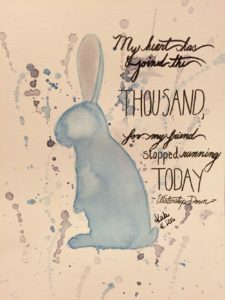 There are so many of us who write, and so many voices that get drowned out. I want to tell you about one of them. I want to tell you about my friend K.C. Ball.
There are so many of us who write, and so many voices that get drowned out. I want to tell you about one of them. I want to tell you about my friend K.C. Ball.
She wrote short stories as well as novels, and I edited her collection, Snapshots from a Black Hole. She was talented and terrific at including emotion, while at the same time she was capable of spinning out a shaggy dog story to groaningly effective length.
K.C. was always conscious of time nipping at her heels, particularly after a heart attack where her wife Rachel (literally) saved her life with CPR. At the same time, she was a private and introverted person, not well-suited to the sort of buy-my-book shilling that’s sometimes necessary to be heard over the crowd. She kept hoping for more support from the networks she saw supporting other people, particularly some of the young white males whose work was appearing at the same time that she first started getting published. I met with her a couple of times to go over stories, but as time passed, she seemed more and more discouraged, feeling as though she was flinging work out into the void and not hearing much back.
She was trans, and older than me by a couple decades, and sometimes seemed bemused by the times we live in. I kept urging her to submit her stuff to places like the Lambda Awards, but she was reluctant. “Those aren’t for me,” she said, and I left it at that, albeit reluctantly. She could be a little cranky, a little morose and pessimistic, and sometimes I’d tease her into a better mood, and sometimes I’d let her be. She’d worked as a prison guard, and sometimes her outlook on the world was as cynically informed by that as you’d expect, but her stories were full of heroes and people living up the idea of being better. She loved superheroes.
I ran into her two years back at the grocery store, on Christmas Day, and she seemed pleased that I ran over to greet her. Now I’m regretting not being better about keeping in touch after she fell away from the writing group we shared, despite the fact that we were living so much closer to each other now that I’ve moved to West Seattle.
And now she’s gone, fallen to another heart attack, and she never really got the chance to “break out” the way many writers do, which is through hard work, and soldiering on through rejection, and most of all playing the long game. If you want to read some of her kick-ass work, here’s the collection I edited, Snapshots from a Black Hole and Other Oddities.
I’m so sorry not to able to hear your voice any more, K.C. I hope your journey continues on, and that it’s as marvelous as you were.
August 24, 2018
Where I’ll Be: DragonCon 2018
Friday
10-1 I will be at the Bards Tower in the Dealers Room.
Title: Science Fiction Writers of America (SFWA) meeting
01:00 pm Location: Marietta – Hyatt (Length: 1 Hour)
SFWA members, come hear about all the cool stuff we’ve been doing and how you can take advantage of it.
Title: Reading Session: Cat Rambo
04:00 pm Location: Marietta – Hyatt (Length: 1 Hour)
Saturday
3-7 I will be at the Bards Tower in the Dealers Room.
Title: When Magic Is Not Enough: Healing
07:00 pm Location: Embassy EF – Hyatt (Length: 1 Hour)
Description: What to do when you can’t just pull up the hospital, the healing spells just aren’t enough–or worse, have run out. Plus the inside scoop on making things workable when it comes to injuries and diseases.
Sunday
10-2 I will be at the Bards Tower in the Dealers Room.
Title: 15-Minute Mentor Session
Time: Sun 02:30 pm Location: Embassy G – Hyatt (Length: 1 Hour)
Description: A chance for budding authors to talk one-on-one with a successful industry professional about business, promotion, the writing process, and career advice. Sign up in the Writer’s Track (Embassy C-D).
Title: What the World Needs Now Is Fantasy, Sweet Fantasy!
08:30 pm Location: Embassy EF – Hyatt (Length: 1 Hour)
Description: No, not just for some, but for everyone… Talking about how Fantasy literature is used to explore social issues & change. There’s enough room in Fantasy for everyone!
Monday
Title: All the Subs! (or, at least, a good number of Fantasy categories)
01:00 pm Location: Embassy EF – Hyatt (Length: 1 Hour)
Moderator / MC for panel
Description: Ever wonder what litRPG is? Or Supervise? How about Weird West? Prairie Gothic? Time for some answers! What makes these splinter parts of Fantasy more than just one-off themes.
Title: What Can SFWA Do for You?
02:30 pm Location: Embassy CD – Hyatt (Length: 1 Hour)
Description: SFWA has dozens of services for its members, so it’s easy to overlook things. In this presentation, the Science Fiction & Fantasy Writers of America will present an overview of things SFWA can do for you. Afterwards, SFWA representatives will be available to answer questions.
August 22, 2018
Guest Post: Rachel Fellman Chews on Bad Food in Fiction
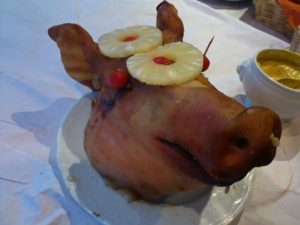 Look, I love to write about terrible food. Life contains so much more of it than good food, or at least my life does. (I have limited funds and poor judgement for risk.) But more than the realism, I’m drawn to bad food because it infuses a scene with context, with a messy pathos. Someone failed before this dish was even served.
Look, I love to write about terrible food. Life contains so much more of it than good food, or at least my life does. (I have limited funds and poor judgement for risk.) But more than the realism, I’m drawn to bad food because it infuses a scene with context, with a messy pathos. Someone failed before this dish was even served.
I think about the scene in Tinker, Tailor, Soldier, Spy in which the spymaster George Smiley tells the story of his one meeting with his Soviet opposite number, Karla. Sitting in a greasy restaurant with his confidant, he takes a few bites of his chicken, murmuring, “There, that shouldn’t offend the cook.” By the end of the scene, he’s given up on the dish, “over which white flakes of fat had formed like seasonable frost.” I mean, the frost isn’t even unseasonable. It is correct that this is happening; it is meet. That chicken died for nothing and everyone knows it.
The cook may have made an unpalatable dish for a sad, unhungry man, but Le Carré prepares a nose-to-tail butcher’s feast of pathos and waste. One of the points of the scene is that Smiley tried and failed to pull a Not So Different Speech on Karla; he ruined it because he’s honest, and honestly lonely. The chicken fulfills its destiny in a way that’s perfect for the mood. It doesn’t symbolize Smiley’s feelings – nothing so cheap. Le Carré is a subtler chef than that. Each grim bite of Smiley’s chicken evokes a universe where no spymaster, no heroic fieldman, no great analyst, no chicken farmer or chicken or roadhouse chef, can catch a single break.
I come from a Patrick O’Brian family, and when I mentioned this post to my brother Aaron, he ran to find the bit in The Far Side of the World where Captain Jack Aubrey serves up a lobscouse on which “the liquid fat [stands] half an inch deep over the whole surface.” Later, a pie leaks “thin blood [thin blood!].” As Aaron points out, the pie is rich with social worldbuilding: “Jack has no cook and he’s had to rely on various sailors who don’t actually know how to provide dishes. He’s high class enough that he can’t cook, but he exists in a social setting where he can make one set of people cook for him and another pretend to enjoy the terrible results. […] I feel like a lot of bad meals in literature say stuff about power. One thinks also of the meals Charles’ dad attacks him with in Brideshead Revisited. First red dishes, then white dishes!”
I am myself, as I have said, a gleeful writer of tragic food. It’s true that my debut, The Breath of the Sun, doesn’t have the worst food I’ve ever written. This is because I cut a scene in which a character orders something called “chicken cogulare,” which beats out a scene from a previous manuscript in which a Potemkin village of breakfast pastries is served by an evil prince.
It’s also because The Breath of the Sun is a mountaineering novel, and the literature of survival has a very specific relationship with bad food: since these stories are about scarcity, they’re also about the miracle of having food at all. I remember a meal of spaghetti and fried garlic bread in Kim Stanley Robinson’s underrated Antarctica, which prompts a character to contemplate that Antarctic food, eaten in “extreme states of hunger,” “often tasted wildly delicious even if it was very plain fare.” By the same token, who could forget the “feast of hot water” with which Genly and Estraven celebrate their ice trek in The Left Hand of Darkness (or the hot beer, oddly pleasant in an ice age, over which they make the first moves of their complicated friendship)? Some of the food on Gethen is very fine, and some of it is bad, but it is always transmuted by the sharing at the hearth.
In The Breath of the Sun, when my characters eat dried chicken and biscuit (singular, because in Arctic narratives “biscuit” is a monolithic item), and when my narrator Lamat observes that this biscuit needs to be heavily hydrated with saliva before it can be swallowed, I want to evoke a purely practical un-food. Dehydrated and preserved, it doesn’t feel prepared by human hands. For my two cranky and embittered heroines, the solitude of climbing is both terrible and delicious, and so is the dried pap you eat from a tube. To climb is to leave the context of the earth, and I use food to stretch out that feeling as far as it will go.
Even a breakfast the characters eat when not on the mountain, served by Lamat’s velvety and brutal ex-husband, has this feeling of detachment. Served on “a dirty white table” in an empty courtyard, it is “an untidy heap of miscellaneous food — rolls and dates and apples with an unpleasant touch of lemon-juice to them, boiled eggs.” The same preservation, the same detachment, but this time there’s nothing delicious or terrible about it, only a mess of context on a plate.
Lamat’s a bartender and innkeeper when not climbing, and I think the only food she really trusts anymore is what she makes herself. When she imagines the mountain from the city, she can only conjure “a morning like a clear glass cup of tea and an egg.” And when she comes home to her lover, she describes her as “a burning breath of coffee, a sense of solidity and strength […] a steady fierce look like some tame animals have.” Home is the right drink on the right breath, and privacy.
Good food is a joy of literature, of course, just as in life. But for subtle worldbuilding, for comedy, for the interplay of hospitality and power — give me the bad stuff. It is a dish of vertiginous depth. Plus, I don’t have to taste it.
 Bio: Rachel Fellman is an archivist in Northern California. She writes sharp, painterly science fiction and fantasy about her various preoccupations: art history, extreme survival, toxic love, queer identity, and terrible moral choices. Most of her protagonists are great at exactly one thing and are continually prevented from doing it. Publishers Weekly called her debut novel,
The Breath of the Sun
, “an atmospheric, poetic, and occasionally wry and brutal story that moves with the gentle but unstoppable momentum of an iceberg.” She does not climb mountains.
Bio: Rachel Fellman is an archivist in Northern California. She writes sharp, painterly science fiction and fantasy about her various preoccupations: art history, extreme survival, toxic love, queer identity, and terrible moral choices. Most of her protagonists are great at exactly one thing and are continually prevented from doing it. Publishers Weekly called her debut novel,
The Breath of the Sun
, “an atmospheric, poetic, and occasionally wry and brutal story that moves with the gentle but unstoppable momentum of an iceberg.” She does not climb mountains.
August 9, 2018
Where I’ll Be: WorldCon 2018
 Thursday I will be at the SFWA board meeting. Huzzah!
Thursday I will be at the SFWA board meeting. Huzzah!
Friday, August 17
8-10 am SFWA Business Meeting SJCC 210DH
11 AM Successfully Negotiating Book Contracts SJCC 211C
A publisher’s interest and an author’s are not always in perfect alignment. Enter the contract. Each clause in the contract exists for a reason. Which ones protect an author’s interest and which ones benefit the publisher? How do you ask for changes? What are the rights an author should be prepared to give up and which ones should you fight tooth and nail for. Hear from agents and other industry experts on how to survive your book contract negotiation with your skin, and your rights, intact.
1 PM Un-pulping the Pulp Heroes SJCC 211C
Doc Savage. The Shadow. G8. Tarzan. The hero pulps are full of characters immersed in fast-paced action, but they sometimes come across as problematic or naive to modern readers. It can be uncomfortable to recognize the sexism or racism of their day. And yet, there are still things that we love about pulps. How have pulp heroes influenced contemporary SF writers (in surprising and strange ways)? How are writers currently reinventing and subverting pulps?
3 PM What Can SFWA Offer Me SJCC 210F
Learn what SFWA has to offer authors at all stages of their careers, from networking opportunities to sample contracts to the grievance committee. SFWA’s officers will provide an update on what SFWA is doing and where the organization is going and answer questions from potential (or current) members.
Saturday, August 18
1 PM Autographing
5 PM Chasing Shadows: Living in Our Transparent Society SJCC 210B
Camera phones are ubiquitous, security cameras monitor many street corners, drones scout the skies, police wear bodycams, facial recognition technology is developing, and social networking allows everyone to keep an eye on everyone else. Is it the surveillance nightmare of Big Brother, or has our technology made possible a realm of sousveillance, where we can monitor those in power and keep them in check? What are the advantages and disadvantages of living in a brave new world, bathed in light?
Most of the time you will find me in the SFWA suite!
July 26, 2018
Guest Post: Tiffany Meurat Talks About Two Reasons Day Jobs Are Good For Writers
 I sat at a desk that I shared with two other people as a piece of paper was handed to me from my boss. I was nineteen years old, my boss was my dad, and the paper was an estimate for repairs for one of our clients. I don’t recall for what repairs exactly or even the cost, except that this client was going to be pissed at whoever was unfortunate enough to deliver the expensive news.
I sat at a desk that I shared with two other people as a piece of paper was handed to me from my boss. I was nineteen years old, my boss was my dad, and the paper was an estimate for repairs for one of our clients. I don’t recall for what repairs exactly or even the cost, except that this client was going to be pissed at whoever was unfortunate enough to deliver the expensive news.
“You need to call them,” I was told. And that was that.
My father had started his pool company from scratch one year before I was born. I had worked a few jobs before joining the family ranks, but eventually landed there out of convenience and a false notion that it would be a simple job—answering phones, taking messages and the like. Perhaps even a little filing. Having just dropped out of university that year, just having any job at all was my only career ambition at that moment.
So, the estimate in hand, I called the client with zero idea just how to properly approach the topic of “I know money is tight for you, but here’s an estimate for lots of money and, oh, your pool won’t work until it’s fixed”. It did not go well. I said something stupid. Then I spent the next hour or so apologizing to both the client and my boss/dad. And right there in that moment of customer service hell, I also began to understand the cunning power of words.
I continued to learn through multiple failures, out of self-preservation to not get yelled at. I learned about words through phone calls and faxes and emails, through hirings and firings, through employee reviews and business acquisitions. I learned by drafting proposals and contracts. I learned while attending conventions and conferences and pool industry galas (yes folks, this is absolutely a thing).
Being the poster child for introversion and working in one the most customer facing industries on the planet, I taught myself how to articulate properly in order to get people out of my personal space bubble as quickly and efficiently as possible. This meant knowing how to talk to them, knowing how to manipulate the situation, how to arm myself with just the right word at just the right moment to mitigate shit blowing up in my face.
At nineteen I wasn’t even sure I wanted to be a “real” writer yet. I was still in the mapping-out-battle-scenes-in-my-journal stage of writing. I hadn’t even the faintest idea of how to structure a basic scene, let alone a novel. Yet there I was, getting a crash course of the versatility of words, whether I wanted it or not.
At a speaking event I attended recently, author Kim Stanley Robinson touched on the benefits of day jobs for writers. It was a refreshing take, considering the engagement was hosted by Arizona State University and attended in bulk by students, of which I was not. Nothing makes you feel more like a flame out loser than surrounding yourself with a room full of MFA candidates, and as I was shrinking into my seat, feeling woefully outclassed as a full time pool lady, part time writer, Mr. Robinson began to speak about yet a second creative benefit to day jobs—mining the work place for inspiration.
I immediately perked up, piecing together all the ways I was already doing just that. How I used the eccentricities and flare and dynamism of the people I work with, incorporated so many of their quirks, their smiles and their hair styles, to turn my characters paper skin to flesh—The grandfather that kept a dedicated drawer in his work desk for Hillshire Farms meat, the coworker that interrupted a work meeting to announce the name of his car (Trixie), the mother (me) whose kid brushed his teeth with a highlighter one day when brought to work with her.
Authors sometimes see a day job as a hindrance to their writing life. The goal is to eliminate it, but in actuality it can be fuel. It’s life, it’s robust and strange and frustrating and chaotic. The characters are literally kicking down the doors, smashing their faces against the windows, and begging us to buy some girl scout cookies from their kid.
I always joke that the second I could make a living wage off of my writing all you’d see is a me-shaped cloud of dust in my office where I used to sit. And maybe I would dial it back a bit, work part time, but I’m finding more and more that to ditch the day job entirely is not part of my ideal future. It’s far too lucrative.
Or perhaps I’m just saying that to convince myself that it’s totally cool that I haven’t sold a book yet. Time will tell.
Author bio for Tiffany Meurat: Tiffany is a writer and desert dweller from Phoenix, Arizona. Her work can be found or is forthcoming with Four Chambers Press, Eunoia Review, Collective Unrest, Martian, and others. She is most often found wasting time on Twitter as @TMeuretBooks
July 24, 2018
Guest Post: Khoa D. Pham Investigates The Waffle House Inspiration
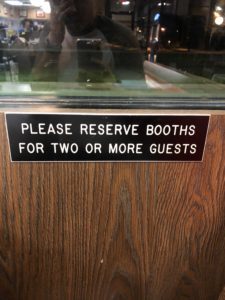 Edward Hopper’s Nighthawks (1942) is one of my favorite paintings. There’s something uniquely inspirational in the drama and mystery of strangers gathered at a late-night diner. I also like it because it’s stylistically uncluttered, focused, and full of Mad Men era nostalgia. Recently, I had to pick up some friends from the airport at 5:30 am. Because I like to be painfully early, whether to catch a flight, or to pick people up, I left at 3:00 am. Naturally, I had some time to kill, so I dropped into a nearby Waffle House to see what it might have been like to be one of Hopper’s nighthawks. And also for breakfast.
Edward Hopper’s Nighthawks (1942) is one of my favorite paintings. There’s something uniquely inspirational in the drama and mystery of strangers gathered at a late-night diner. I also like it because it’s stylistically uncluttered, focused, and full of Mad Men era nostalgia. Recently, I had to pick up some friends from the airport at 5:30 am. Because I like to be painfully early, whether to catch a flight, or to pick people up, I left at 3:00 am. Naturally, I had some time to kill, so I dropped into a nearby Waffle House to see what it might have been like to be one of Hopper’s nighthawks. And also for breakfast.
After a few minutes on the interstate, I took an offramp and made a right turn onto an empty road. The darkness was occasionally punctuated by hotel marquees, stop lights, and an unmistakeable bright, yellow-blocked Waffle House sign. I pulled into the empty parking lot and backed my Jetta under the amber glow of the lone street lamp. At least someone might see me if I got mugged.
Through the windows, I saw a man behind the bar, most likely the cook, and a young lady seated at the end of the counter reading a book. Great, I wasn’t the only nighthawk. And someone should definitely see if I get mugged. I grabbed my trusty notebook from my book-bag and headed in.
There was an American flag sticker on the front door which I half expected to jingle with bells when I opened it. No bells. The globe lights above the bar bathed the dark walnut veneer of the countertop in a warm, diffuse glow. The air conditioning and refrigeration units droned in the background. A Touchtunes jukebox sat on the wall to my right along a row of red stools. It managed hit all the wrong notes of nostalgia and capitalism in one dirty, grey, plastic stroke. And who needed music when you have the soundtrack of clinking plates, and whisking eggs to accompany you?
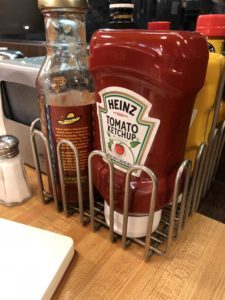 “How ya doin babes? Just you tonight?” said the woman from the end of the counter. She was a young girl with hair as brown as the pecan pie she was having for breakfast, and judging from her black apron, also my waitress.
“How ya doin babes? Just you tonight?” said the woman from the end of the counter. She was a young girl with hair as brown as the pecan pie she was having for breakfast, and judging from her black apron, also my waitress.
“Yup. Just me. Mind if I grab a booth?” I asked.
“Anywhere ya like. As you can tell we’re standing room only right now.” she said with a wink.
“I’ll keep my elbows to myself then.”
I chose a seat at the far end of the restaurant, by the window, right in front a sign that read “PLEASE RESERVE BOOTHS FOR TWO OR MORE GUESTS”. Oops. The waitress grabbed a pad from beside the register and sashayed up to my booth.
“What’ll ya have babes?” she asked. Babes. Not babe. Never babe.
“Let me start with a coffee” I said, looking around for a menu.
“I got you.”
 A few seconds later, she brought me a single-page, laminated, red, white, and blue menu, because breakfast, after all, was the most American meal. It seemed like I could just point to a picture and get exactly what was in the picture. It took me a while to orient myself to the heiroglyphics. Did I want two triangles of toast, a yellow lump of eggs, and a floating disc of sausage? Or did I want white blob, a full square of toast, and yellow blob? I was still sleepy so I figured I’d play it safe. Steak and scrambled eggs please, with hashbrowns, smothered and coverd, which in Waffle House parlance meant with diced onions and cheese.
A few seconds later, she brought me a single-page, laminated, red, white, and blue menu, because breakfast, after all, was the most American meal. It seemed like I could just point to a picture and get exactly what was in the picture. It took me a while to orient myself to the heiroglyphics. Did I want two triangles of toast, a yellow lump of eggs, and a floating disc of sausage? Or did I want white blob, a full square of toast, and yellow blob? I was still sleepy so I figured I’d play it safe. Steak and scrambled eggs please, with hashbrowns, smothered and coverd, which in Waffle House parlance meant with diced onions and cheese.
“You got it sweetpea.” Sweetpea. Things were getting serious now.
As she took my menu back, a white hatchback with Pennsylvania plates, and tinted windows pulled up to the window about twenty feet away from the diner and stopped.
“Was that car here when you pulled up?” she asked.
“No.”
“God, I hope nothing weird happens tonight. It’d be great if nothing weird happened again.”
Again? I passed two Waffle Houses on the way to the airport and stopped at this one because I deemed it to be the safest looking one. Swing and a miss. As I waited for my breakfast and potential weirdness to be served, I opened my notebook and took in my surroundings. So this was what it felt like to be in the Hopper painting.
What was it about diners that alway made them feel so familiar? Was it the condiment carrier with the perpetually sticky bottles? The empty dispenser of palm-sized napkins with the syrup ring? The waitress brought me my coffee in a speckled, thick-walled, ceramic mug. It was hot, black, and tasted just enough like coffee. It met the absolute minimum definition of coffee, didn’t try to be anything more, and it was perfect.
 The breakfast arrived shortly after on an oval plate. The steak was thin and shaped like no piece of meat I had ever seen before. The eggs were yellow and lumpy, just as the menu promised. The hashbrowns arrived with a very discernable, only slightly melted square of American cheese, fresh from the wrapper, slapped right on top. And I got a bonus four triangles of toast on the side. Aces!
The breakfast arrived shortly after on an oval plate. The steak was thin and shaped like no piece of meat I had ever seen before. The eggs were yellow and lumpy, just as the menu promised. The hashbrowns arrived with a very discernable, only slightly melted square of American cheese, fresh from the wrapper, slapped right on top. And I got a bonus four triangles of toast on the side. Aces!
My notebook laid opened on the table.
“You have the prettiest handwriting I’ve ever seen” she remarked.
“Thanks.”
My notes were in cursive. Rage against the dying of the cursive, I say. It was probably for the best that she didn’t clearly see what I was writing down. She might’ve thought I was a health inspector or a food critic. Maybe she thought that anyway.
A steady stream of nighthawks trickled in as I ate my uniquely delicious breakfast. A young black man with earbuds and a contruction vest ponied up to the bar while watching videos on his phone. A middle-aged white man with a goatee and a polo sat down two booths away from me, also ignoring the two person rule. After that, a lesbian couple, an older latino gentleman, and a sleepy looking freshman joined the fray. And thus the portrait was complete, the nighthawks, all together at a Waffle House at 3:00 am. And somewhere between the smothered hashbrowns and slices of toasts were little morsels of inspiration.
Author bio for Khoa Pham: I’m an aspiring writer from North Carolina. Being brand new to this craft, I’m trying to read and write as much as I can. I’m fortunate to have a colorful background that I can pull from to help me write my stories. I’m an actor, veteran, designer, woodworker, immigrant, and new father. Hopefully soon, I’ll be able to add published writer to that list. Writing has been a great outlet for me to get all of the ideas out of my brain space.
Follow him on Twitter as @khoadpham
July 20, 2018
Classes for the Rambo Academy through October
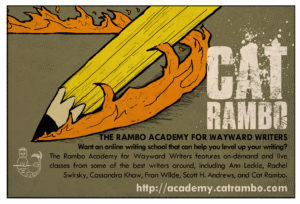
Image by Keith Rosson. www.keithrosson.com
Here’s what many of you have been waiting for! The list of classes coming up for the Rambo Academy. I’ll be updating the website over the next couple days but for right now, this is the official, correct, list. Please note there’s some new times here and there!Rights and Reprints with Doug Smith Saturday, July 21, 9:30-11:30 AM Pacific time
Anthropomorphic Agenda: Writing Furry Fiction with Kyell Gold Saturday, July 28, 9:30-11:30 AM Pacific time
Detail and Image with Rachel Swirsky Sunday, July 29, 9:30-11:30 AM Pacific time
Old Stories into New with Rachel Swirsky Saturday, August 11, 9:30-11:30 AM Pacific time
Teen Story Workshop with Alethea Kontis Sunday, August 12, 9:30-11:30 AM Pacific time
Crypto- and Xenobiology and You: How To Build a Better, More Believable Beast, Using SCIENCE! With Seanan McGuire Saturday, August 25, 9:30-11:30 AM Pacific time
Ideas are Everywhere with Rachel Swirsky Sunday, August 26, 9:30-11:30 AM Pacific time
Breaking the Rules with Rachel Swirsky Sunday, August 26, 1:30-3:30 PM Pacific time
Breaking the Rules with Rachel Swirsky Saturday, September 8, 9:30-11:30 AM Pacific time
Ideas are Everywhere with Rachel Swirsky Saturday, September 8, 1:30-3:30 PM Pacific time
Fantastic Worldbuilding with Fran Wilde Sunday, September 9, 9:30-11:30 AM Pacific time
Beginnings and Endings with Cat Rambo Wednesday, September 12, 4-6 PM Pacific time
Writing Steampunk and Weird Western with Cat Rambo Wednesday, September 19, 4-6 PM Pacific time
Journaling for Creativity with Fran Wilde Saturday, September 22, 1:30-3:30 PM Pacific time
Writing Flash Fiction with Cat Rambo Sunday, September 23, 9:30-11:30 AM Pacific time
Literary Techniques for Genre Writers with Cat Rambo Wednesday, October 3, 4-6 PM Pacific time
Speculative Poetry with Rachel Swirsky Sunday, October 7, 9:30-11:30 AM Pacific time
Reworking, Revising, and Rewriting with Cat Rambo Wednesday, October 10, 4-6 PM Pacific time
To Space Opera and Beyond with Ann Leckie Saturday, October 13, 1:30-3:30 PM Pacific time
Detail and Image with Rachel Swirsky Sunday, October 14, 9:30-11:30 AM Pacific time
Writing Your Way Into Your Novel with Cat Rambo Wednesday, October 24, 4-6 PM Pacific time
Moving from Idea to Finished Draft with Cat Rambo Sunday, October 28, 9:30-11:30 AM Pacific time
More classes are in the works, including classes on game and comic writing. Subscribe to the newsletter to get advance notice before they’re posted!
Live classes are taught online via Google hangouts, are limited to 16 participants, and require reliable Internet connection, although in the past participants have logged on from coffee shops, cafes, and even an airplane. A webcam is strongly suggested but not required. If there is an on-demand version of the class, you will be provided with a free coupon for it, so you have access to those notes.
To register for a class, send e-mail with the following details:
The email address that you use for Google stuff.
Which class or classes and the dates.
Whether you would prefer to pay via Paypal, check, or some other means.
Please identify yourself if you are a returning student or support Cat on Patreon to qualify for the special rate.
You should receive confirmation of your registration within 48 hours.
July 19, 2018
Where I’ll Be: GenCon 2018
Here’s my schedule for GenCon this year. Come say hi if you’re there too!
Thursday
12:00 PM Ballrooms 3-4 Creatures Great and Small: A Speculative Bestiary
3:00 PM Atlanta Space Opera: SF, Fantasy, Romance?
4:00 PM Atlanta Using the Scientific Method in Spec Fic
Friday
11:00 AM Austin What’s Hot and What’s Not: Fantasy
1:00 PM Atlanta Interstellar Travel
4:00 PM Signing Table Signing–Cat Rambo, Erin Evans, Chris Jackson
7:00 PM Worldbuilders Fundraising Event
Saturday
12:00 PM Austin What Makes a Story Science Fiction?
1:00 PM Boston The Morphing of the Story
2:00 PM Boston Surviving Social Media
3:00 PM Ballrooms 3-4 The Long and Short of Fiction
5:00 PM Ballroom 1 What is SFWA and What Can It Do For You?
If you’re a student, Patreon supporter, or friend, drop me a line about the Sunday morning group breakfast I’m trying to organize.
July 11, 2018
When and Why to Hire an Editor, And What They Should (and Shouldn’t) Do
The question of hiring an editor often comes up in my classes, and since editor for hire is one of the hats I wear, I wanted to provide some overview. There are different kinds of edits. I’m focusing on two: the developmental edit versus the copy edit. You might also hire someone to proofread, where they are simply looking for mistakes and errors, rather than making any editorial suggestions.
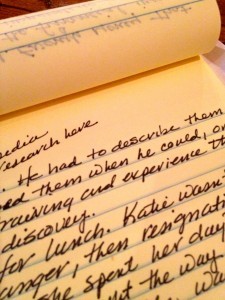 Developmental Editing
Developmental Editing
A developmental edit is an edit that looks at the big picture stuff. It is not a final edit, but an edit designed to help the writer improve on the manuscript’s strengths and address its weaknesses. The order of things may change, characters may get added or dropped, pieces of the plot may be altered. It does not do things like fix typos or look at individual sentences.
You want a developmental edit towards the beginning of the revision process, rather than after you’ve spent a lot of time polishing sentences, because polishing something that may get chopped out is inefficient and discouraging. This is an early draft, but one in which you have filled all the obvious holes and perhaps run it past a beta reader or two.
You want an editor who respects your style and your vision as well as the story’s voice. Your editor should take the time to identify all of those, working to tell you how to strengthen them and make them more effective, rather than to change them into the editor’s vision of the story. This is why editors are not one size fits all — it is quite possible to hire an editor who simply does not grok your style.
Developmental editors charge around $50 an hour, according to the Editorial Freelancers Association, which estimates 1-5 pages per hour. This…seems somewhat excessive to me, but I also read much faster than most people. When I work out the math of things, that’s $20k for a 100k word manuscript, which seems insane to me and is more than I would dream of charging. Another editor quoted a rate to me of 1 cent a word for developmental edits, which is about the lowest I would go, I think. Either way, you are looking at a decent amount of money and when you are spending that sort of sum, you do make sure that you are getting your money’s worth. Talk to other clients or read some of the editor’s writing. It is perfectly kosher to ask for a sample edit, but limit that to a few pages. Asking for a free chapter edit is a bit much; remember that’s a significant chunk of time for an editor and so they simply cannot afford to do many of these. In all honesty, I have enough clients willing to forego sample edits that I usually will not do them but will send the client elsewhere to someone more willing to perform that work without compensation. If you really don’t want to hire someone for a novel edit without a sense of their editing style, perhaps hiring them to edit a short story or essay might work just as well.
What I give a client in a developmental edit package is almost always the same, and I think many developmental editors work along similar lines: a 4-5k word write-up of suggestions for the overall manuscript, focusing on different areas that include plot, pacing, characterization, worldbuilding, etc; a copy of their manuscript with comments/notes specific to chapters; and notes/suggestions about their writing strengths and weaknesses along with a few pages of sample edits intended to help them work at the sentence level. For example, I might say something like, “You have very long paragraphs, here’s how I might break one up,” and provide a few samples. Included in all of this is a call beforehand where we discuss what they want from the edit and the option to do a call or lunch afterward where we talk about specific strategies and questions the client has about the edit.
Is a developmental edit always necessary? No. It can save you some work and time, and it can make a manuscript stronger in a way that may make an agent or editor accept it, but in my experience, they will also want to provide developmental edit level notes. If you cannot afford a developmental edit, a reasonable substitute is work: finding beta readers and then reading through and incorporating their feedback, looking in particular for places where they don’t understand what’s happening or don’t care about what’s happening.
Copy-editing
A copy edit is not going to do a lot of big change level stuff. It’s going to look instead at the sentence and paragraph level. This is for me the most labor-intensive kind of editing, and the amount of time it takes really depends on the writing. The last project I did required a decent amount of work, and my speed was 5-15 pages per hour. A few projects before that, I did an edit for a professional writer, and that edit moved considerably faster, because her work was already pretty clean and tight.
A copy-edit happens towards the end of the revision process. Usually the editor will go through the manuscript with track changes on and the writer will later go through, accepting (and sometimes rejecting) those changes. I would not expect a copy-editor to make suggestions for structural changes, but they might suggest an overall formatting strategy and they should definitely make things consistent as far as spelling, punctuation, and similar formalities are concerned.
Copyediting is a pain in the butt and it’s also expensive. Here you’re looking in the $40 an hour range, according to the EFA again. But this may be something that’s particularly useful for newer writers, because going through changes and thinking about why the editor made them can be truly enlightening. This is something I learned early on when working with my college paper. A good editor really tightens and clarifies sentences, and makes them effective and efficient. A superlative editor will show you how to write sentences that sing.
Again, you want an editor that figures out what your style is, and makes your prose more of that, rather than re-writing it to make it their own. A good editor can be a revelation; a bad editor can discourage and dishearten.
Is a copy-edit always necessary? Not a paid one, no. But you really should get someone to look over stuff if you can, because otherwise you will miss things. It simply is not possible for a writer to catch every mistake, and there will always be something that you find, and kick yourself about, later. If you do not have the financial resources, perhaps figure out a barter with someone, even if it’s just swapping manuscripts around with your crit group. On the other hand, as you know from reading, there are errors even in the books that have gone all the way through the traditional publishing process and its layers of edits.
Thinking about Becoming an Editor?
If you are a good editor, this is not a bad way to earn money. I would suggest that one thing you will want to do is figure out a schedule and amount of time you’re willing to do it, and make sure you don’t get deluged, even if it means turning down a project sometimes. Time and energy spent editing someone else’s work is time and energy that doesn’t get spent on your own. Remember that and plan accordingly.
Thinking about the revision process? Check out the Rambo Academy for Wayward Writers‘ on-demand class, Rewriting, Revising, and Fine-tuning Your Fiction.



